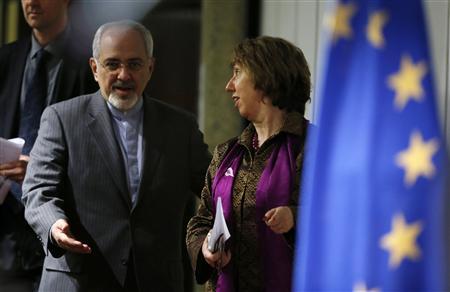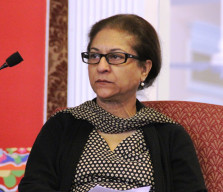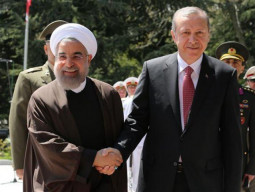
ISLAMABAD: Iranian Foreign Minister Mohammad Javad Zarif arrived in Pakistan on Wednesday and is likely to urge it to reject a request to join a Saudi-led campaign against Iran-allied Houthi forces in Yemen.
Iranian Foreign Minister Mohammad Javad Zarif arrived in Pakistan on Wednesday and is likely to urge Islamabad to reject a request to join a Saudi-led campaign against Iran-allied Houthi forces in Yemen.
“Iran considers Pakistan as an important country for a solution to regional problems,” Zarif said, while speaking to Iranian media in Islamabad.
“We believe that consultations with Pakistan for a solution to regional problems are necessary,” he added.
“Pakistan has a special position for Iran. We want peace and security in the region,” an IRNA correspondent, who was at the airport, quoted the Iranian FM as saying.
Further, Zarif briefly spoke about the recent killings of eight Iranian guards in an attack on a border region along Pakistan.
Read: Iran border clash culprits will be brought to justice: FO
“Unfortunately, both Pakistan and Iran face terrorism and extremism and in a latest terrorist attack, eight Iranian guards were killed on Monday,” Zarif said.
A senior Pakistani foreign ministry official Syed Sajjad Haider and Iranian diplomats received the Iranian foreign minister on arrival at the Islamabad airport.
Zarif will hold official talks with prime minister’s senior aide Sartaj Aziz later on Wednesday, after which they will hold a joint press conference, the Foreign Ministry said.
The Iranian foreign minister arrived from Oman where he exchanged views with Omani officials on the crisis in Yemen.
Iranian Foreign Ministry Spokesperson Marzieh Afkham said on Tuesday that Zarif would convey Iran's deep concern over the humanitarian plight in Yemen in his talks in Pakistan and Oman.
A section of the Iranian media has reported that Tehran was concerned at reports of Islamabad extending support to Saudi Arabia and its Arab allies in strikes against Houthi rebels in Yemen.
Prime Minister Nawaz Sharif called on Tuesday for Iran to get involved in talks on security in Yemen as parliament debated whether Pakistan should join the Saudi-led operation.
Zarif has repeatedly said the conflict in Yemen should be overcome through dialogue and not firepower. Other countries accuse Iran of using the conflict as a cover to expand its regional influence.
"All countries must work toward establishing stability and preventing the spread of insecurity in the region," Zarif said last month.
The royal family of Saudi Arabia and Iran's theocracy are rivals for power in the Middle East. Their competition frequently fuels sectarian violence.
Last month, a Saudi-led coalition began conducting air strikes in Yemen against Houthi rebels allied with Iran. Saudi Arabia and Yemen share a border and Saudi Arabia says it is afraid that instability might spill over to its territory.
Saudi Arabia wants its staunch ally, Pakistan, to join the coalition, and has requested ships, aircraft and troops.
The parliament began debating the request on Monday and legislators have been united in the view that Pakistan should not send troops for the Saudis to use in Yemen.
Although there are many groups in the complex Yemen conflict, lawmakers fear it could develop into a proxy war between Saudi Arabia and Iran, and inflame already simmering sectarian tension at home.
Pakistan shares a long, porous border with Iran in its gas- and mineral-rich southwestern province of Balochistan, where rebels have for years been battling the government.
Iran has proposed building an export pipeline to gas-starved Pakistan, a project postponed because of the threat of US sanctions and Pakistan's lack of cash and investors.
Iran's Sistan-Baluchestan province has long been plagued by unrest from both drug gangs and militants. The population of the province is predominantly Sunni.
Prime Minister Nawaz has said he will defend Saudi Arabia's "territorial integrity" but not spelled out what, if any, commitments he has made. On Tuesday, Nawaz told lawmakers Iran should be part of the debate.






















































COMMENTS (8)
Comments are moderated and generally will be posted if they are on-topic and not abusive.
For more information, please see our Comments FAQ